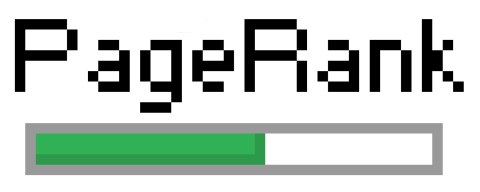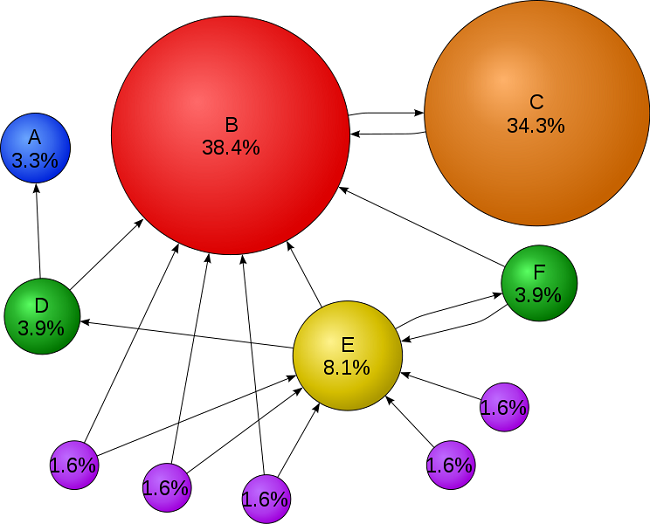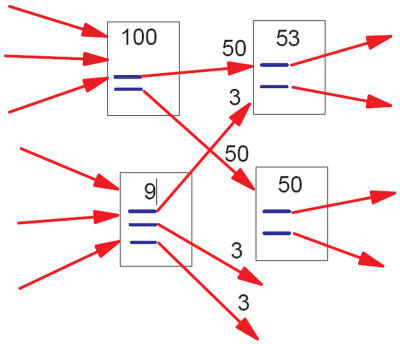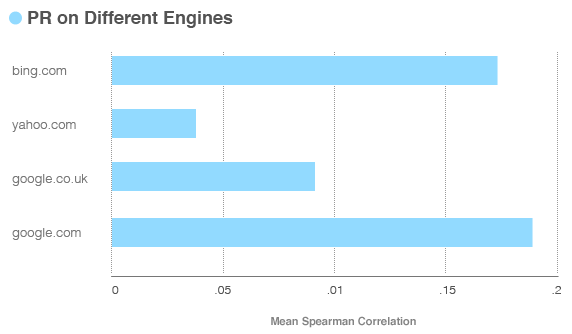It’s hard to talk about search engine optimisation without the issue of PageRank coming up. Some specialists consider it to be the be all and all of SEO and track it religiously.
The team here at CLOUDROCK belongs to the other camp – it’s nice to know but not something we’re overly worried about. However, we’ve heard a lot of misinformation out there so we’ve decided to publish our take on it.

Quick Primer on PageRank
PageRank is only concerned about the links on your site. It has nothing to do with any on-page factors such as your site structure or page load speed.
From the original Stanford University paper by Google founders Lawrence Page and Sergey Brin, The Anatomy of a Large-Scale Hypertextual Web Search Engine:
PageRank can be thought of as a model of user behavior. We assume there is a “random surfer” who is given a web page at random and keeps clicking on links, never hitting “back” but eventually gets bored and starts on another random page. The probability that the random surfer visits a page is its PageRank.
It is named after Google co-founder Larry Page, who came up with the algorithm. It is just part of Google’s search algorithm, which takes into consideration hundreds of factors.
PageRank is applied on a page-level and not on a site-wide level. When you hear people say “My website has PR5”, they are usually referring to the PageRank of their home page.
Google’s PageRank is reportedly based on a logarithmic scale of base 10. This means that if it costs you 10 points to increase your PageRank from 3 to 4, it will cost you 100 points to increase it from 4 to 5. This explains why it’s quite common to find websites with a PageRank of 3-4, but only a handful of 10s.
Links as Votes
A link to your website is treated as a vote. This means that every time another site links to yours, it is treated as a vote for your site. It’s saying that “Hey, we trust this website”. It was a revolutionary idea when it first came out and helped search engines separate the meritorious from the meretricious.
Not all inbound links are treated equally of course.
A link from your mom’s blog is not as effective (but we still appreciate it anyway, Mom!) as a link from more trusted and authoritative website such as CLOUDROCK (okay, kidding), SEOmoz or Search Engine Watch.
Image Credit: Wikipedia
If you look at the image above, you can see that Website C has a higher PR than Website E, even though Website E has more links pointing to it. The quality and relevance of your inbound links are more important than the quantity.
How Link Juice Flows Through Your Website
Imagine Page A has only one inbound link with a value of 100 pointing to it. If there are 2 links on Page A to other pages on your website (Page B and Page C), it will pass 50 points to each of them (there is a damping factor but we’re going to ignore that for now).
In a nutshell, the more links you have on a page, the less link juice flows to each page it links to.
Does this mean you shouldn’t link out to other pages?
Not at all.
Google will find that unnatural (link hoarding) and will most likely penalize pages with no outgoing links. You should link out to high quality and relevant websites. Your readers will certainly appreciate it.
The Diminishing Importance of PageRank
Over the last several years, we have seen PageRank playing a less central role. Google seems to be trying to move away from links as the primary method of ranking pages, adding elements such as social signals and co-citations into the mix.
The image above was taken from a SEOmoz study that examined the correlation between rankings and PageRank. It proved the correlation between rankings and PageRank for Google US was 0.18 and half that for Google UK. A score of 1.00 shows a perfect correlation while 0.00 means that the correlation is completely random.
Their study shows that while there is a positive correlation between ranking and PageRank, the latter has only a minor effect. That’s not surprising at all since Google uses over 200+ (and increasing) factors in their search algorithm.
PageRank Infrequently Updated – Google releases its PageRank only once every few months, so the reported PageRank you see in the Google Toolbar is hardly ever accurate. This makes it hard to track how well you’re doing. If you can’t measure it with any reasonable accuracy, then it doesn’t have much value as a metric.
One Among Many Other Factors – Google uses over 200 factors to determine a particular page’s ranking with respect to a particular keyword. PageRank is just one of them. A high PageRank should be treated as a pleasant by-product of a good link building campaign, and should not be sought after in itself.
Less Impact on Ranking – PageRank has little bearing on the ranking of a particular page. Think about it, if it was that important, websites such as Facebook and The New York Times (both PR10) would rank for every conceivable search query. The CLOUDROCK website has ranked well for competitive keywords such as ‘Malaysia SEO’ even when our website just launched and our PR was N/A.
Google Says Stop Fussing – Google itself has been telling us not to worry about PageRank, even going to the extent of removing it from their webmaster tools. Here’s what Googler Susan Moskawa had to say about it:
“We’ve been telling people for a long time that they shouldn’t focus on PageRank so much; many site owners seem to think it’s the most important metric for them to track, which is simply not true. We removed it because we felt it was silly to tell people not to think about it, but then to show them the data, implying that they should look at it. :-)”
PageRank is still a factor to how well you rank, but there are other more important metrics that you should worry about such as traffic and revenue.
And yes, be wary of any SEO that still keeps harping on PageRank. Those are the ones with only surface knowledge of SEO (PageRank is one of the first jargon a budding SEO comes across) and probably know just enough to be dangerous (to you!).



